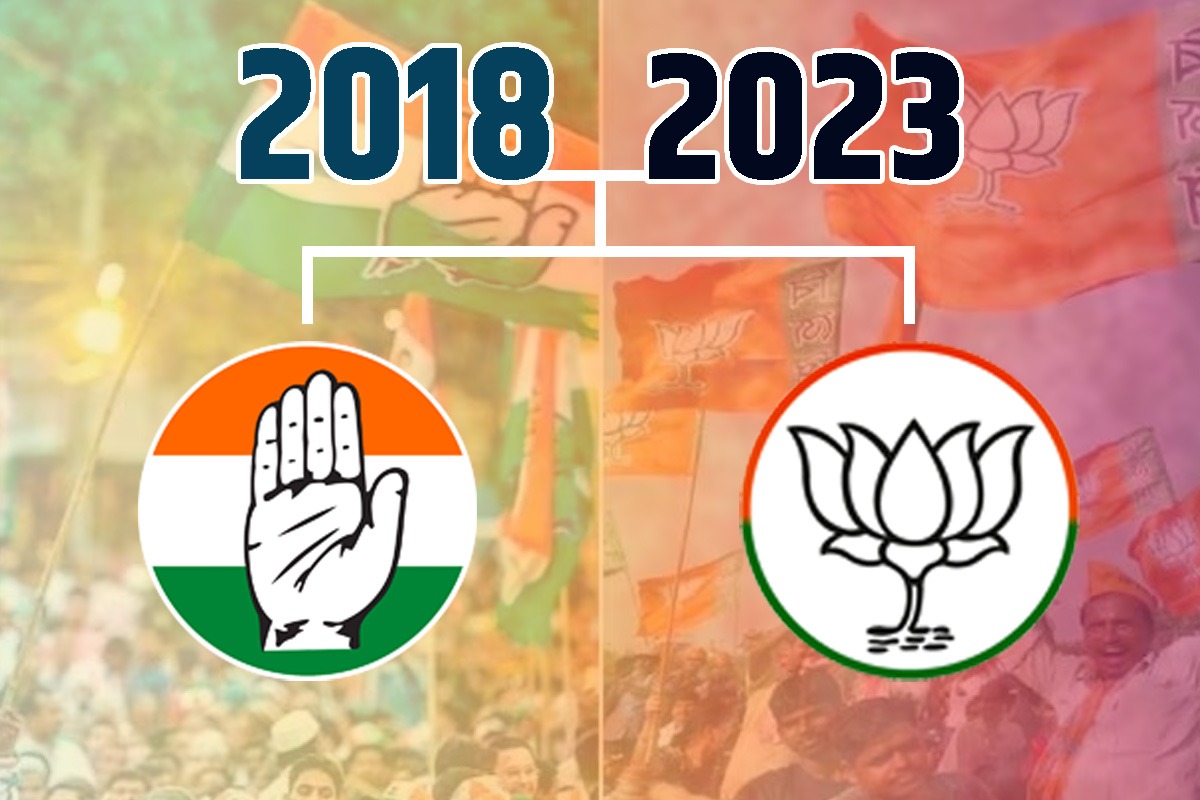NEW DELHI: In the recently concluded assembly elections across four states on Sunday, the Bharatiya Janata Party (BJP) triumphed by unseating the opposition in three Hindi Heartland states.
The saffron party not only defeated anti-incumbency in Madhya Pradesh but also effectively wrested control of state legislatures from its arch-rival Congress in both Rajasthan and Chhattisgarh. The results of the Assembly elections indicate a significant boost to Prime Minister Narendra Modi’s prospects for a potential third term in office.
Data Analysis of the vote share of MP elections:
The BJP secured an overwhelming landslide victory in the MP Assembly, claiming a total of 163 out of the 230 seats. In stark contrast, the Congress lagged far behind, securing only 66 seats, landing in the second position.
Compared to the 2018 elections, where the BJP garnered 41.02 per cent of the votes, there was a significant surge in voter support. This surge propelled the BJP from 109 seats in 2018 to a substantial victory of 163 seats in the recent elections. On the other hand, the Congress was able to win the 2018 elections with 114 seats, securing a vote share of 48.55 per cent.
Data Analysis of the vote share of Rajasthan elections:
The BJP secured a resounding victory in the Rajasthan Legislative Assembly, clinching an impressive 115 seats, while the Congress trailed with 69 seats. The saffron party commanded a substantial vote share of 41.79 per cent, underscoring its widespread support, while the Grand Old Party attained a vote share of 39.57 per cent in the polls.
Comparatively, in the 2018 elections, the Congress managed a 43.04 per cent vote share, securing 100 seats. In the same contest, the BJP faced a setback, obtaining just 73 seats in the 199-member assembly, with a vote share of 36.68 per cent. These contrasting electoral outcomes highlight the significant shift in political fortunes and voter sentiments between the two election cycles, shaping the current composition of the state’s Legislative Assembly.
Data Analysis of the vote share of Chhattisgarh elections:
The BJP has successfully clinched a substantial 13.3 per cent increase in vote share, resulting in a significant turnaround that ousted the Bhupesh Baghel-led Congress government in the Chhattisgarh assembly elections.
The party amassed an impressive 46.27 per cent of the total votes cast across the 90 constituencies, outshining the Congress, which trailed with a vote share of 42.23 per cent. Securing dominance with 54 seats, the BJP amassed a total of 72,34,968 votes, surpassing the Congress, which secured 35 seats and received 66,02,586 votes.
In 2018, a notable departure from the usual pattern occurred as the elections witnessed a substantial 10.07 per cent difference in vote share between the Congress and BJP. The Congress, riding a wave of popular support, secured a significant 43.04 per cent vote share, resulting in the claim of 68 seats. Meanwhile, the BJP had to contend with a less favourable outcome, securing just 15 seats in the 90-member assembly and a vote share of 32.97 per cent. This stark contrast in results highlights the impactful variations in voter preferences and political dynamics that characterised the election cycle of that year.
Data Analysis of the vote share of Telangana elections:
In the current 2023 assembly elections, Congress emerged victorious in the elections with an impressive 53.78 per cent vote share, securing a total of 64 seats. In contrast, the BJP managed to secure only 8 seats in the state, accompanied by a modest voter share of 6.72 per cent.
It’s noteworthy that in the 2018 elections, Congress was only able to secure 19 seats and a vote share of 28.4 per cent. During that electoral cycle, the BJP only secured a single seat and held a voter share of 0.84 per cent.
Low margins of wins between BJP and Congress:
In MP, three seats were secured by narrow margins. The seat of Shajapur saw a BJP victory with a slender margin of just 28 votes. On the other hand, the constituencies of Dharmapuri and Mahidpur witnessed victories through comparatively bigger margins yet insignificant in the long run with 356 and 290 votes respectively.
In Chhattisgarh, the BJP secured victories in Ambikapur with a slim margin of 94 votes and Pathalgan with 255. Notably, the seat of Kanker witnessed the narrowest margin in this election, with the BJP prevailing by just 16 votes. These results highlight the closely contested nature of the electoral competition in the state.
In Rajasthan, the electoral landscape unfolded with the BJP securing victory in Kathumar by a margin of 409 votes. On the other hand, Udaipurwati witnessed a Congress triumph with a margin of 416 votes.
Congress wins by large margins:
Although Congress clinched victory in one state during the elections, the party’s success lacked consistency in securing overwhelming majorities across the states. The highest margin of victory for the party in any constituency across the four states was observed in Mancherial, Telangana, with a vote margin of 66,116 votes.













